#BSFA Review
Text
EXCESSION - Iain M. Banks (1996)
People change. It must have been 2008 when I started reading fiction again, and Iain Banks’ Culture series became among the first things I devoured. Excession was my favorite of the series back then, and I decided it was time to reread it – hopefully to be entertained and awed again, and, at the very least, to take a long, hard look in the mirror of time.
For those unfamiliar with Banks & the…
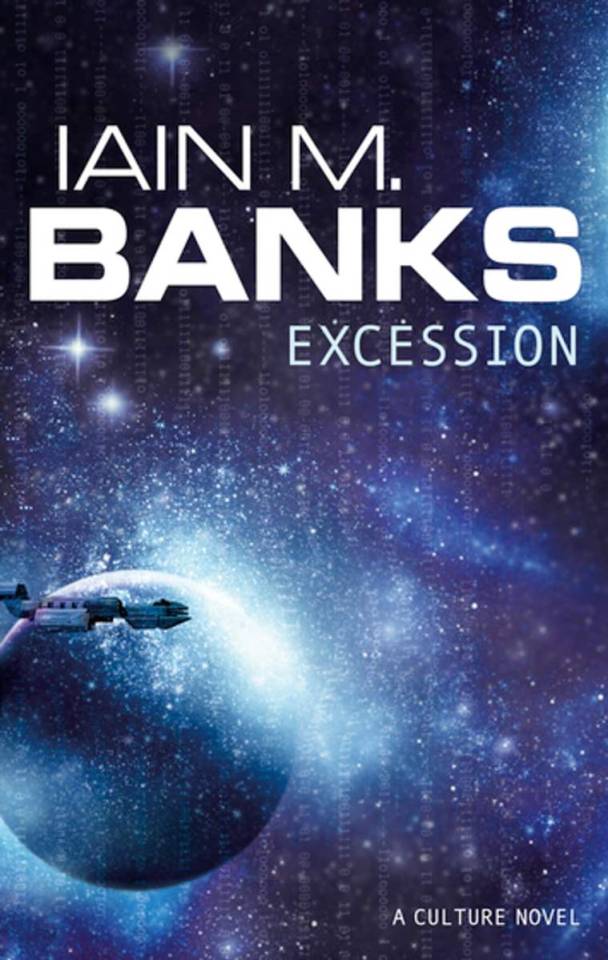
View On WordPress
3 notes
·
View notes
Photo
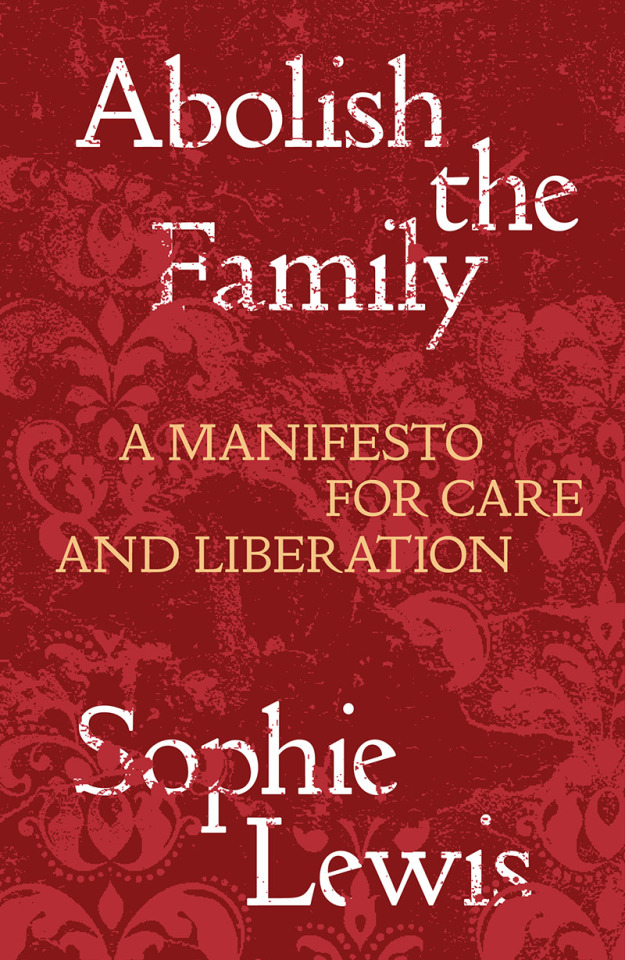
Review: Abolish the Family!
BSFA's Vector Journal
Collaboratively written by the Beyond Gender Research Collective
“We work, not for inclusion into the family, or a queered version of it, but for a queer mode of being together which retains what Lewis calls the “abolitionist freight” of the word ‘queer’, “signifying resistance to capitalism’s reproductive institutions: marriage, private property, patriarchy, the police, school” (19). This non-contingent, non-privatised way of living is what Abolish the Family offers us, as people and as SF scholars. We hope that those in the business of creating, shaping, reading and tearing apart the imagined worlds of SF texts will take Lewis’ challenge to think more critically about the family to heart. More than this, we hope that they will work to nurture the “latent utopian kernels” of family abolitionist possibility located in our present (82).”.
Editors: Jo Lindsay Walton & Polina Levontin
2 notes
·
View notes
Photo

The Cleaving by Juliet E McKenna
The Cleaving is an Arthurian retelling that follows the tangled stories of four women: Nimue, Ygraine, Morgana, and Guinevere, as they fight to control their own destinies amid the wars and rivalries that will determine the destiny of Britain.
The legendary epics of King Arthur and Camelot don’t tell the whole story. Chroniclers say Arthur’s mother Ygraine married the man that killed her husband. They say that Arthur's half-sister Morgana turned to dark magic to defy him and Merlin. They say that the enchantress Nimue challenged Merlin and used her magic to outwit him. And that Arthur’s marriage to Guinevere ended in adultery, rebellion and bloodshed. So why did these women chose such dangerous paths?
As warfare and rivalries constantly challenge the king, Arthur and Merlin believe these women are destined to serve Camelot by doing as they are told. But men forget that women talk. Ygraine, Nimue, Morgana and Guinevere become friends and allies while the decisions that shape their lives are taken out of their hands. This is their untold story. Now these women have a voice.
Book page: https://angryrobotbooks.com/books/the-cleaving-juliet-mckenna-arthurian-retelling/
My Review:
I’m a sucker for everything related to the Arthurian cycle or Matter of Britain: from Geoffrey of Monmouth to Wolfram von Eschenbach, from Thomas Malory to Chrétien de Troyes.
A love that was born after reading The Once and Future King by T.H. White and The Merlin Chronicles by Mary Stewart.
Like many of my generation I read the first feminist retelling and love it: The Mists of Avalon. It was so successful that also became a sort of sacred text for some people.
My last love was By Force Alone by Lavie Tidhar
Even if the Matter of Britain is often seen as knights-battles-magic the women plays a relevant role: from Guinevere to Nimue, from Ygraine to Morgause, from Viviane the Dame of the Lake to Iseult. These women play a relevant role in the saga but they’re often the seductress or the villain.
The Cleaving was the right book for me and I was very curious about it as the story was told by the POV of these women.
I enjoyed the story and I found it quite riveting as I was immersed in a realistic world where some people can use magic and the women are subject to power plays but they’re also strong and clever and they can play their own power games.
I loved these women and I was happy to read a different version of Nimue: not the treacherous pupil who seduced and imprisoned Merlin but a woman with magical power who plays in a fair way.
Merlin is a sort of villain, a magical being who will not stop to achieve what he saw in the future.
I would have liked to know more about Nimue and Merlin and the lore of their people. I have different theories but it would be great to know if they’re sort of fey or druids or what else.
The author did a good job in delivering a compelling and fascinating story, it kept me hooked and turning pages.
I suffered from book hangover as it usually happens when I read a good book and have to be back in the XXI century.
Many thanks to Angry Robots for this digital copy, all opinions are mine.
The Author:
Juliet E. McKenna is the author of 15 epic fantasy novels set in the world of Einarinn, as well as several novellas and countless short stories ranging from SF to steampunk and alternate history. Her contemporary fantasy Green Man novels, published by indie Wizard’s Tower Press, have sold over 28,000 copies since 2018. She has been a judge for the World Fantasy Awards, the Arthur C. Clarke Award, the James White Award and the Aeon Award, and has, herself, been shortlisted for the British Fantasy Award and the BSFA Award for Best Novel. In 2015 she was awarded the Karl Edward Wagner Award for special achievement by the British Fantasy Society. She is a regular at science fiction conventions, and is a 3rd Dan Aikido black belt.
Website: www.julietemckenna.com
Twitter: @JulietEMcKenna
https://angryrobotbooks.com/our-authors/juliet-e-mckenna/
4 notes
·
View notes
Text
Great review of Warning Light Calling on The BSFA Review #19
Great review of Warning Light Calling on The BSFA Review #19
Warning Light Calling has been reviewed by the British Science Fiction Association in their winter edition of the BSFA Review.
Link: https://www.bsfa.co.uk/
Susan Peak writes:
“This book is probably as much SF genre as a lot of New Wave fiction, which is to say very little, but it is memorable.”
“If you are already interested in SF poetry, then I would say this is worth seeking out provided…
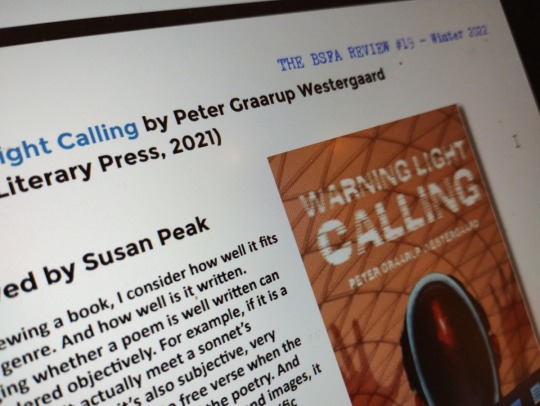
View On WordPress
0 notes
Text
BOOK REVIEW: ESCAPOLOGY BY REN WAROM
Escapology by Ren Warom (Titan Books, 2016)
If I reveal that the characters in Escapology, Ren Warom’s first novel, have names such as Amiga, Shock, Twist and Deuce then some of you will immediately deduce a great deal more about the book. You’ll intuit that this is an everyday story of hacker folk. You may guess that these down-at-heel types live in a world of improbably lurid crime bosses. Or that the events take place amidst a mulched-together mish-mash of far Eastern cultures. You’ll almost certainly be able to predict that the plot revolves around an improbable heist and semi-mystical technology.
Escapology crams all the familiar cyberpunk set-dressing between its covers with a completeness that feels almost like compulsion. From an unlikely virtual reality realm in which hacking requires solving Crystal Maze style puzzles to neon-splashed, rain-sluiced streets filled with ramen bars – all the unmistakable elements are formed with cookie cutter neatness and tidily stacked. Whether this is taken as an opportunity to revel in nostalgia or as a tedious rehashing of a worn-out future will, I suppose, depend upon the reader. I found the whole thing a slightly dispiriting experience. It’s not that Escapology doesn’t have nice moments – there’s a car chase escape in the final quarter that is a well-handled action sequence and some of the dialogue was sharp enough to make me laugh out loud. However, the whole thing is so firmly fixed on familiar rails that I frequently struggled to find any motivation to return to the book.
Escapology is too long. There’s a subplot about giant paddle-wheel-driven moving islands whose purpose I still haven’t fathomed. Other events drag on at extraordinary length and forward momentum is thrown away as viewpoint characters pause to muse on history and sociology or indulge in amateur psychological analysis of their own motivations. There is a leaner, more enjoyable, 300 page novel struggling to free itself from the 450 pages presented here and an editor should have found it.
Cyberpunk has always had a problematic relationship with “The East” – smothering it with love even as it alienates us from the object of its desire. Even at its best the subgenre has tended to use Eastern cultural references as lazy exoticism. During cyberpunk’s first-flowering the appropriation of Eastern cultural elements at least served a purpose – unsettling Western readers’ comfortable assumptions about what the future should look like. Even then, though, it was often a problematic technique. Four decades on, this seam has been worked to exhaustion and the descent into over familiarity and cliché has undermined any usefulness in the tropes.
It’s never clear to me what purpose the Korean, Chinese and Japanese cultural paraphernalia serves in Escapology or why this range of cultures are mushed together except, perhaps, that it provides the characters something interesting to eat (it feels as though there’s a lot of food in the novel.) Some of the characters are identified as Asian but everyone speaks and thinks in the same sardonic, Californian-inflected internal monologue that is another trope of soft-boiled cyberpunk. In mannerism, voice and thought the main characters are, too often, indistinguishable and all cultural diversity feels skin deep.
Ironically, had Warom set her story amongst the chippies and curry houses of the Midlands (where her biography says she lives) instead of an imagined Occident then Escapology’s cyber-noir stylings might have felt stranger, fresher and more interesting.
One curious element of Escapology is the treatment of the central character Shock’s (a hacker, obviously) transgender status. Warom is clearly sympathetic but the denouement – in which Shock is forced to accept a part of him (an avatar in the form of an octopus) that is apparently innately and resolutely feminine despite his painful rejection of that identity – is uncomfortable. I believe Warom is trying to give the character a sense of peace after a (literally, in places) tortuous character arc – but the best one can say about it is that it feels confusing.
Some readers will revel in Escapology – glad to back in this kind of place with these kinds of people. I can see that appeal. But this familiarity also edges the book too close to pastiche and is its greatest weakness. There were moments when I did enjoy the book. And there were moments which I genuinely enjoyed. But I’ve been down these neon-lit streets and surfed these virtual landscapes too often. I won’t be returning for the sequel, Virology, which is already on sale.
A slightly shorter version of this review originally appeared in The BSFA Review (No. 10, Spring 2020).
BOOK REVIEW: ESCAPOLOGY BY REN WAROM was originally published on Welcome To My World
0 notes
Photo
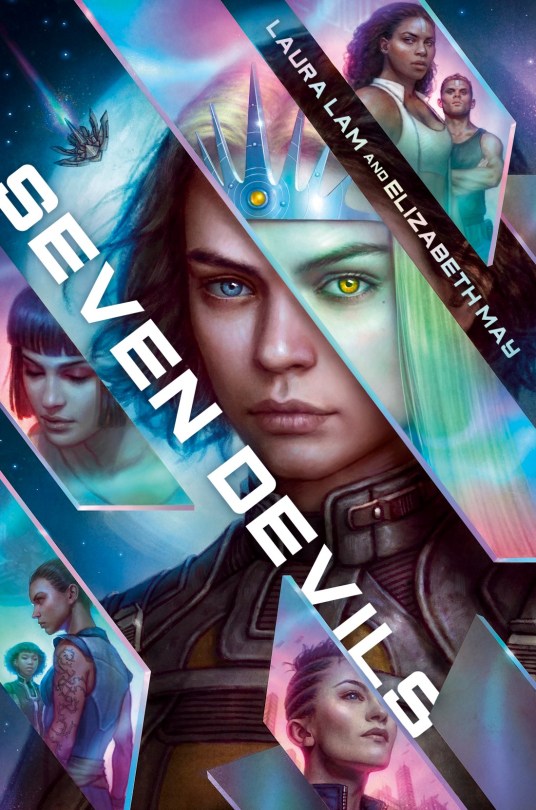



Seven Devils is now out in US paperback! (UK paperback came out a few months ago).
This book was a Sunday Times bestseller and is basically STAR WARS BUT MAKE IT NEARLY ALL WOMEN AND GAY. We sometimes also call it Mad Max: Fury Road meets Rogue One.
Representation: autistic, asexual, lesbian, bisexual/pansexual, trans, disabled (amputee).
PURCHASE LINKS: https://www.penguinrandomhouse.com/books/607293/seven-devils-by-laura-lam-and-elizabeth-may/9780756418281
Cover copy:
This first book in a feminist space opera duology follows seven resistance fighters who will free the galaxy from the ruthless Tholosian Empire–or die trying.
When Eris faked her death, she thought she had left her old life as the heir to the galaxy’s most ruthless empire behind. But her recruitment by the Novantaen Resistance, an organization opposed to the empire’s voracious expansion, throws her right back into the fray.
Eris has been assigned a new mission: to infiltrate a spaceship ferrying deadly cargo and return the intelligence gathered to the Resistance. But her partner for the mission, mechanic and hotshot pilot Cloelia, bears an old grudge against Eris, making an already difficult infiltration even more complicated.
When they find the ship, they discover more than they bargained for: three fugitives with firsthand knowledge of the corrupt empire’s inner workings.
Together, these women possess the knowledge and capabilities to bring the empire to its knees. But the clock is ticking: the new heir to the empire plans to disrupt a peace summit with the only remaining alien empire, ensuring the empire’s continued expansion. If they can find a way to stop him, they will save the galaxy. If they can’t, millions may die.
Praise:
“A thrilling ride from two of the most exciting authors in the genre.” —Gareth L. Powell, BSFA award-winning author of Embers of War
“More gripping than The Expanse.” —Charles Stross, award-winning author of The Laundry Files
“I was promised Mad Max: Fury Road in space—I got that and so much more. Seven Devils is an explosive new addition to the space opera genre. May and Lam had me from the first severed finger! This is a book you are not going to want to miss and the start of a series that promises to be a wild ride.” —K. B. Wagers, author of the Farian War trilogy
“Lam and May bring a multivoice story from a group of diverse, courageous females attempting to save themselves and their galaxy. Backstories and present-day actions are built into an alien setting, well-rounded characters, and an action-filled plot with themes of colonization, military manipulation, and conditioning.” —Library Journal (starred review)
And it’s only SIX MONTHS until the conclusion to the duology, Seven Mercies.
Like so many books, it came out during the pandemic. Books live and die by worth of mouth, so if you enjoyed it, please shout about it! And if you’ve never heard of it before but your eye was caught by the beaaaautiful cover by Dan Dos Santos, please consider picking it up?
Aesthetic made by one of our editors, Leah Spann at DAW.
Thanks for reading! <3
-Laura Lam
#seven devils#seven mercies#science fiction#space opera#gays in space#be gay do crime#sff#sf#illumicrate#not ya but crossover#lauralam#elizabeth may#sciencefiction#queerbooks#queerlit#queersff#starwars#madmaxfuryroad#rogueone
22 notes
·
View notes
Text
Lavie Tidhar’s UNHOLY LAND is shortlisted for The Kitschies and more

Lavie Tidhar and cover artist Sarah Anne Langton at Forbidden Planet (photo: Jon Harrison via Twitter)
The Kitschies announced the shortlist for their annual award.
The Kitschies reward the year’s most progressive, intelligent and entertaining fiction that contain elements of the speculative or fantastic. We are proudly sponsored by Blackwell’s.
Circe by Madeline Miller (Bloomsbury)
Record Of A Spaceborn Few by Becky Chambers (Hodder & Stoughton)
Rosewater by Tade Thompson (Orbit)
The Smoke by Simon Ings
UNHOLY LAND by Lavie Tidhar
Congrats to all the nominees.
The BSFA also announced their annual awards.
Best Artwork
Ben Baldwin – wraparound cover for ‘Strange Tales’ slipcase set (NewCon Press)
Joey Hi-Fi – cover for ‘Paris Adrift’ by EJ Swift (Solaris)
Sarah Anne Langton – cover for UNHOLY LAND by Lavie Tidhar (Tachyon Publications)
Sing Yun Lee and Morris Wild – artwork for ‘Sublime Cognition’ conference (London Science Fiction Research Community)
Likhain – In the Vanishers’ Palace: Dragon I and II (Inprnt)
Bede Rogerson – cover for ‘Concrete Faery’ by Elizabeth Priest (Luna Press)
Del Samatar – artwork for ‘Monster Portraits’ by Sofia and Del Samatar (Rose Metal Press)
Charlotte Stroomer – cover for ‘Rosewater’ by Tade Thompson (Orbit)
Congrats to all the nominees.

Eyal Kless at TOR.COM included UNHOLY LAND among Five Fascinating Works of Israeli Speculative Fiction.
My first recommendation is an expat, Lavie Tidhar, who was born and raised in Israel but lived all over the world (a very Israeli thing to do…). He has won numerous prestigious awards for his books, including the 2010 World Fantasy Award for Best Novel (Osama). CENTRAL STATION is perhaps the most sci-fi of his books, but all of his stories deal with speculative fiction and he is unafraid of touchy subjects. In A Man Lies Dreaming, Tidhar creates an alternative reality in which Hitler is a private eye; The Guardian called it “a Holocaust novel like no other.”
Tidhar’s latest work, UNHOLY LAND, touches on another delicate subject by delving into Israel’s history. The story is set in a reality where Theodor Herzl, the head of the Zionist movement, accepted the offer made by Joseph Chamberlain, the British Colonial Secretary at the time, to establish the state of Israel in Africa instead of the Middle East.
For WORLD, John Ottinger III praises the novel.
Tidhar, an Israeli by birth, avoids sermonizing: He merely alludes to the Israel-Palestine conflict and shuns simplistic solutions. The blend of politics, allegory, and alternate-history detective novel is unconventional yet weirdly wonderful.
PILE BY THE BED enjoys the book.
In UNHOLY LAND, Tidhar tries to have his cake and eat it – he wants to examine an alternate history but also play with the very popular science-fiction standby multi-world theory (books such as The Man in the High Castle by Philip K Dick or Brasyl by Ian McDonald and even the most recent Star Trek series, Discovery are good examples of this). And he pretty much succeeds. Along the way he manages to revel in some pulp fiction tropes as his author/protagonist finds himself living in the plot of one of his novels. That plot revolves as much around the threat to the multiverse as it does around Tirosh’s personal quest.
That mix makes UNHOLY LAND provocative, mind bending and gives it some emotional heft.
For more info on UNHOLY LAND, visit the Tachyon page.
Cover by Sarah Anne Langton
#unholy land#lavie tidhar#the kitschies#bsfa#eyal kless#tor.com#john ottinger iii#pile by the bed#review#sarah anne langton
0 notes
Photo

Join 14 people right now at "The BSFA Review Issue 4" http://cheers.ws/Z2mtrz?utm_source=dlvr.it&utm_medium=tumblr
2 notes
·
View notes
Text
Book Review: The Fountains of Paradise by Arthur C. Clarke
Book Review: The Fountains of Paradise by Arthur C. Clarke

The Fountains Of Paradise by Arthur C. Clarke
My rating: 4 of 5 stars
Read for the SF Masterworks Reading Challenge and Science Fiction Masterworks Book Club here on Goodreads, the 12 in 12 Challenge, the LGBTQ Speculative Fiction Reading Challenge, and the Hard Core Sci-Fi Challenge.
This book won the Hugo and Nebula Awards in 1979/1980, and was nominated for the BSFA and the Locus.
This book…
View On WordPress
1 note
·
View note
Photo








UK SF stuff in 1962/3 from the BSFA newsletter
#11. Nov 1961 - survey responses asking readership demographics | “” | #13. May - fairly sure one of the UFO journals reviewed this too and, er, much more negatively | “” | #14. August | #17. June 1963 | “” | “” - the pretentiousness, it burns!
0 notes
Photo
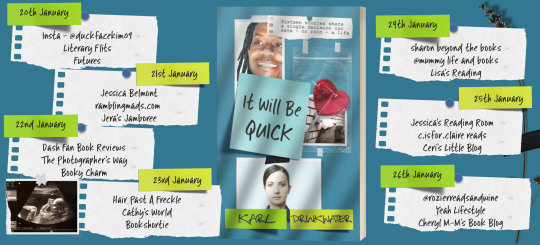
REVIEW
It Will Be Quick by Karl Drinkwater
Sixteen short stories
Twisted, dark, real
Made me think,
What if?
Sadness, loss, pain
Decisions to be made
One way right?
Or maybe wrong?
Each story complete
They pack a punch
Much to consider
And contemplate.
~ WOW ~
* JUST *
~ W O W ~
Brief take on the sixteen stories:
* Fire in the Hole: More than a kidnapping
* Recalling the Boy: Inheritance stirs memories
* SenSorOs: Computer frustration on steroids
* The 6:30 Hole: Can Relationship be reinvigorated?
* Below the Surface: Castaways-survival
* It Will Be Quick: Pregnancy’s impact
* Hell’s Bean Curd: A day out with a twist
* Sweet Nothing: A sweet boy – wanted to take him home with me
* How I Wonder What You Are: Bicycling adventure
* File Killer: Is winning everything?
* Cry Wolf: Powerful – packs a punch
* The Potential: Contemporary dark fairy tale
* Miasma: Ripple effect
* 14: Friendship and a decision
* Balance: Made me sad and angry
* Bloodline: Hope…maybe
Did I enjoy this anthology? Yes although some stories were painful
Would I read more by this author? Definitely
Thank you to the author for the ARC – This is my honest review.
5 Stars

BLURB
It Will Be Quick
A single decision can save – or ruin – a life.
An opportunistic baby theft by a young woman in pain. Two strangers shipwrecked on a lifeless rock, unable to speak the same language. An isolated cycling holiday descends into terror. One woman seeks the courage to destroy her life. A miracle unites a community, and teenagers take a stand against hypocrisy.
Karl Drinkwater presents characters to root for – and characters to dread – in sixteen tales of humanity, endurance, and spirit.
Purchase Links
https://www.karldrinkwater.uk/p/buy-my-books.html
Also https://books2read.com/ap/xr55B8/Karl-Drinkwater

Author Bio –
Karl Drinkwater writes thrilling SF, suspenseful horror, and contemporary literary fiction. Whichever you pick you’ll find interesting and authentic characters, clever and compelling plots, and believable worlds.
Karl has lived in many places but now calls Scotland his home. He’s an ex-librarian with degrees in English, Classics, and Information Science. He also studied astrophysics for a year at university, surprising himself by winning a prize for “Outstanding Performance”. Karl is an active member of the British Science Fiction Association (BSFA), the Horror Writers Association (HWA), and the Alliance of Independent Authors (ALLi).
When he isn’t writing he loves guitars, exercise, computer and board games, nature, and vegan cake. Not necessarily in that order.
Social Media Links –
Website https://karldrinkwater.uk
Twitter http://twitter.com/karldrinkwater
Facebook https://www.facebook.com/karlzdrinkwater
Instagram https://www.instagram.com/authorkdrinkwater/
Newsletter http://bit.ly/newsletterkd

0 notes
Text
EUROPE IN WINTER - Dave Hutchinson (2016)
EUROPE IN WINTER – Dave Hutchinson (2016)
I read Europe in Autumn in 2016, and Europe at Midnight in 2017. I enjoyed them both a lot – Autumn was even one of my favorite reads that year, back when I read a book each week. But for some reason Europe in Winter has been lying on my TBR for nearly 5 years. I really can’t tell you why: I simply was drawn more to other books each time I needed to pick a new read.
The appeal of a review like…
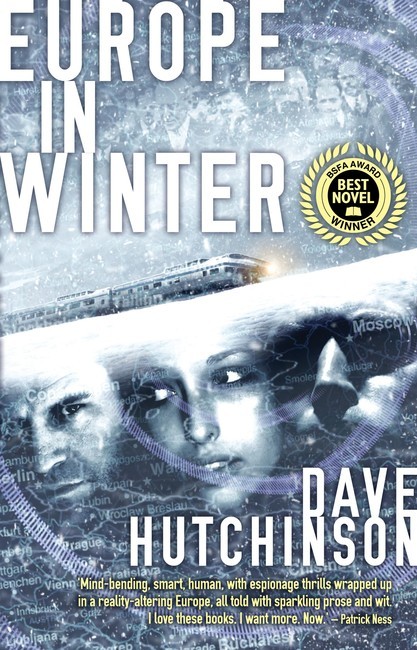
View On WordPress
#2010s#BSFA winner#Dave Hutchinson#Europe in Winter#Fractured Europe#Fractured Europe Sequence#Review#Science Fiction
0 notes
Photo

Congratulations to 2018 Arthur C. Clarke Award-winner, Anne Charnock on publication of her remarkable novel BRIDGE 108 in the UK and US this week. Here are just some of the great reviews so far:
Reviews
“Charnock tells her story through the lives of ordinary people caught up in situations beyond their control, and Bridge 108 is all the more powerful for that.” —The Guardian
“Readers who enjoy coming-of-age stories with hopeful messages will be gratified by this topical tale of human resourcefulness in the face of climate disaster.” —Publishers Weekly
“The novel’s near-future setting feels grimy, sweltering and lived-in. Environmental collapse has brought out the worst in everyone, and instances of kindness are few and far between. It’s a commanding, if demanding, read.” —Financial Times
“Anne Charnock’s Bridge 108 is set in the same universe as her terrific 2013 debut A Calculated Life…[Bridge 108] seems horribly prescient. With the inclusion of climate refugees, child trafficking, and slavery, Bridge 108 adds that final touch of verisimilitude to Charnock’s post-Brexit nightmare.” —LOCUS Magazine
“An interesting and thoughtful book that keeps readers engaged throughout, both emotionally and politically.” —Interzone
“[Bridge 108] tells a very strong message of the potential consequences of allowing global warming to continue as it is. The world that Charnock builds for us is realistic and frighteningly possible in the current political and social environment.” —BSFA Review
“This coming-of-age story, told through a mosaic of voices, is enjoyable for readers young and old alike.” —Kirkus
0 notes
Text
Free Content Compiled by the BSFA
Free Content Compiled by the #BSFA
The British Science Fiction Association is compiling a list of works donated by authors and orginisations for you to enjoy during this difficult time of isolation. The list includes stories, interviews and a digital archive of the BSFA publication Vector.
Authors such as Adrian Tchaikovsky, Gareth L. Powell and many other have generously given free access to their work. The BSFA will create a…
View On WordPress
0 notes
Text
REVIEW: VIRTUES OF WAR AND GHOSTS OF WAR BY BENNETT R COLES
The latest issue of The BSFA Review (no.4, Summer 2018) has been published. It contains two of my reviews. The first one – of a pair of military sf novels by Bennet R Coles – is below. The second will follow shortly.
Bennett R Coles is a former Canadian naval officer. His first two novels (of a promised trilogy) are part of that military science fiction tradition that values “authenticity”. What that means, in this case, seems to be a fondness for three letter acronyms, recounting the petty frustrations of military life and detailed portrayals of brutal violence.
Virtues of War has the advantage of featuring lots of action sequences which Coles delivers with reasonable gusto. Ghosts of War, however, features far too many dinner parties and lengthy digressions in which not much happens. The second book is supposed to make the reader ponder the price soldiers pay for war, but Coles handle neither human emotions nor ethics convincingly.
I had a number of problems with these books. The way they handle women, whose worth seems intimately linked to their physical attractiveness and the divide between white characters (the protagonists) and non-white (villains or sexual trophies) are both disturbing. There are problems with the plotting, too, which is heavily reliant on everyone being egregiously stupid – warships without defences against boarding and secretly constructed routes to and from enemy territory that are left undefended and unmonitored in times of war, for example.
But the most obvious question these books raise is: How should we react to books whose lead character is a war criminal?
In the opening pages of The Virtues of War, Katja Emmes leads her team on a raid to a small farming community, part of the human colony on a planet orbiting Sirius, believing it might harbour terrorists. When the local village leader, a man called Thapa, fails to immediately answer her questions, Katja blows the head off an innocent man, pour encourager les autres. Later, after Thapa leads a revolt against Earth (which, to be fair, includes brutal murder and a threat to have Katja repeatedly raped in a public square) she murders him while he is an unarmed and helpless prisoner. She leads a raid that destroys civilian homes, calling down devastating orbital strikes on inhabited areas and, later, she executes an officer in her own navy who is guilty of being a poor administrator.
Coles makes use of bits of the philosophy of Thomas Hobbes throughout these books: the title of the first book comes from the claim in The Leviathan that “Force and fraud are in war the two cardinal virtues.” This sentence follows Hobbes’s description of a war of “every man against every man” in which no action is unjust: “notions of right and wrong, justice and injustice, have there no place. Where there is no common power, there is no law, where no law, no injustice.” In Ghosts of War, Katja’s commanding officer – Brigadier Korolev – absolves Katja of any wrongdoing in war using this defence. She did what was necessary in a situation where the rules of normal morality cannot be applied. And Coles goes further: for Hobbes individuals live under the protection of the sovereign (whether a monarch or assembly) and, in return, cede the right to question the sovereign’s actions. Earth’s government knows more than its citizens and, Korolev argues: “The people empower Parliament to act in the best interests of the State, and sometimes that means breaking the rules that rightly apply to the people” (256). Neither the rule of law nor petty morality apply to the state – or its agents, like Katja.
It is possible that Coles is playing with his reader. It is possible that the third instalment of the story will subvert all that has gone before and that Katja’s world, nasty, brutish and short as it is, will be turned on its head. Perhaps, in the end, the cruelty of the system she serves will be revealed to her (and to the reader) as an abomination. I have my doubts. But even if that were the case, there is no rescuing these books. Coles is too enamoured with his hero and her violence, he wants us to like her and to be on her side even as Katja is cold-bloodedly murdering innocent people. More than that, especially in Ghosts of War, he wants us to feel sorry for Katja – as if she is a victim. As if she, as an individual, has no moral responsibility for the crimes she commits. Even if the state’s actions were ultimately shown to be unconscionable her position as a subservient agent absolves her of wrongdoing. I couldn’t swallow it. Military veterans may deserve respect for their service but “just obeying orders” – even if coated in a veneer of Seventeenth Century philosophy – is no carte blanche.
How should we react to books whose lead character is a war criminal? With a distinct sense of queasiness.
Virtues of War and Ghosts of War by Bennett R Coles (Titan Books, 2015 & 2016)
This review was first published in The BSFA Review No.4, Summer 2018.
REVIEW: VIRTUES OF WAR AND GHOSTS OF WAR BY BENNETT R COLES was originally published on Welcome To My World
0 notes
Text
Book review of The Risen Empire by Scott Westerfeld
This review of The Risen Empire by Scott Westerfeld was written in 2003 for the British Science Fiction Association‘s magazine, Vector. Tor Hardcover, 2003, Hardback, 304pp, $24.95, ISBN 0-765-30555-0 Parochialism can be a terrible thing. There was I thinking we Brits pretty much had space opera all sown up these days when along comes Scott Westerfeld to poke me in the eye with a ravening death…
View On WordPress
0 notes